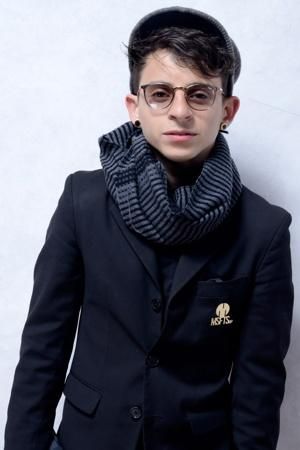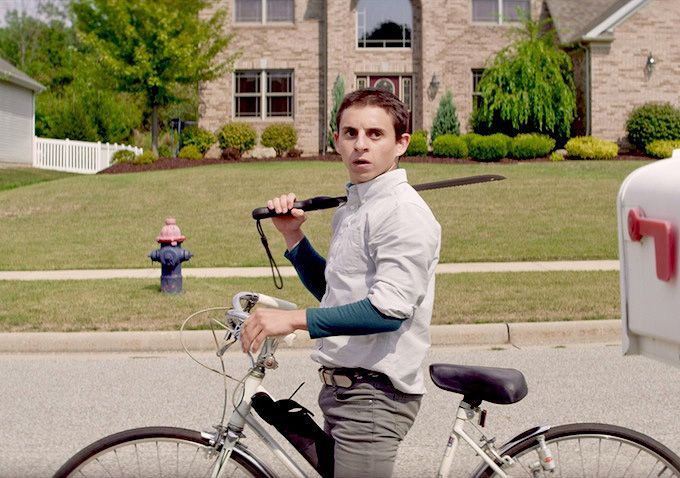A little guy with a big personality, Moises Arias introduced himself to moviegoers last year in a spectacular way, thanks to two radically diverse films: The Kings of Summer and Ender’s Game. In the former, he plays a goofy oddball who becomes an unofficial mascot for two friends trying to escape their parents, and in the latter, he portrays a militant soldier threatened by the arrival of a prodigiously talented cadet. And in both, he distinguishes himself both by fully inhabiting the character, and demonstrating the kind of charisma that transcends the roles he’s playing.
Arias spoke with Spinoff Online at the recent Los Angeles press day for the Ender’s Game Blu-ray. In addition to talking about developing the character, he discussed his approach to acting in general, and the evolution of his career, from his early role on Hannah Montana to finding movie projects that give him opportunities to shine while challenging him in different ways.
Spinoff Online: Talk about how much of this resonated with you personally, or thematically, because it takes these interesting characters and throws them into a very interesting philosophical backdrop.
Moises Arias: The book started that off, just very controversially. But the movie has to carry the same feel and carry its own [feel], and for Bonzo, for me, it was the psychology of why he’s angry. It was all driven through fear – fear of Ender being better than him. There were all of these things that really attracted me to the character very much and allowed me to develop him psychologically. And the movie itself just kind of challenges you in every way – it opens discussions about political, moral ideas, all of these things I really enjoy talking about when I go watch a movie with my friends. Ender’s Game, the book, is one of the most incredible books I’ve ever read, and I think the movie came with its own voice but kind of kept true to the novel. The complexity of the story really makes for, like you said, the very interesting characters thrown into a very sophisticated, potentially real situation.
Ender is sort of the equilibrium point between having a capacity for violence and a capacity for compassion. When you were creating Bonzo, did you think about that balance and what strengths and weaknesses he had?
Bonzo’s a very intricate character because he’s not just angry to be angry. Nobody’s really just angry out of the blue. For me, if I overthink things too much, I tend to get away from my emotional state, so what I try to do is really embody what I feel it would be – how it would feel to my body to have that sort of resentment towards somebody, and things like that. And when I felt a moment of compassion, it would immediately be overpowered by fear and anger, and that really is the psychology of the character from reading the book and from the script also. So you’re just kind of letting the words and emotions come out in a way that also sticks to the description of the character initially.
Were there any specific real-world parallels that you drew upon or were thinking about as you immersed yourself in this world?
No, I think this one was so unique that I really just kind of put myself in that situation and I really see this as a future reality, maybe. So to me it was all very real from the beginning, and that’s really all of the place I had to put myself into, really – just feel it.
With this and Kings of Summer coming out within just months of one another, is one or the other a challenge you have more of an affinity for, or one that you feel more rewarded by tackling?
Interestingly enough, Bonzo and Biaggio were both the most interesting characters I’ve done in my life, even though one’s very dramatic and one’s comedic. They’re both real. I’ve done a lot of characters where it just felt unnatural, and that just comes with experience, and for me it’s finding characters like Bonzo, which is that dramatic, I don’t really come out of the character. When I’m on set, it’s always me kind of having the energy of that character, because to jump back and forth between my personality and Bonzo is very difficult. And even with Biaggio from Kings of Summer, he’s a very interesting, very out-there character and I think the entire time I was in Ohio I was in that group and in that space. And I think you just have to put yourself into a character’s eyes and his emotions and his thought process. And if me reading the script doesn’t spark me to want to put myself through that process, that’s my heart telling me it’s not something I’d like to do.
Actors like Jamie Foxx have talked in the past about the challenges of moving from TV to film. How difficult has that transition been for you?
Absolutely, they’re very different spectrums. I think there’s a different type of art in every even little type of change from TV to movies, or comedy to drama. So when you stack those things it’s different outcomes, but you’re definitely right in terms of how different it is to go from TV to film, especially a sitcom like Hannah Montana to this huge, IMAX, real Ender’s Game, powerful film that really impacts the audiences. It’s bringing everything down to a real area. But I did film at the same time I did TV, and since I was so little, there was no conditioning. I could flow with everything, because my time off from the sitcom I would do a film and just see the different spectrums and get a feel for it. I’ve always been very observant, so I just feel out the energy of a room, of creative individuals. It’s really just being open and susceptible to any given energy that is put on set or whatever it is – just being aware and concentrating.
When do you feel like you have gotten a grasp on a character? Before you step on set? During the filming? Or not until after when you see it assembled in the final product?
I really think that I never truly understand the character, because I never truly understand myself. So it’s ever-evolving – it’s not worrying so much about getting every detail down, it’s about feeling it out. I definitely do preparation before I get on set, but there’s always going to be growth on set because it’s a bounce off the actors, it’s a bounce off the director, it’s everything all together. So you will always find new things, new creativity will spark out of the spur of the moment. So I think it’s just being aware in the moment and knowing who you are to then be able to translate that and become someone else, essentially.
Ender’s Game is available now on Blu-ray and DVD.



